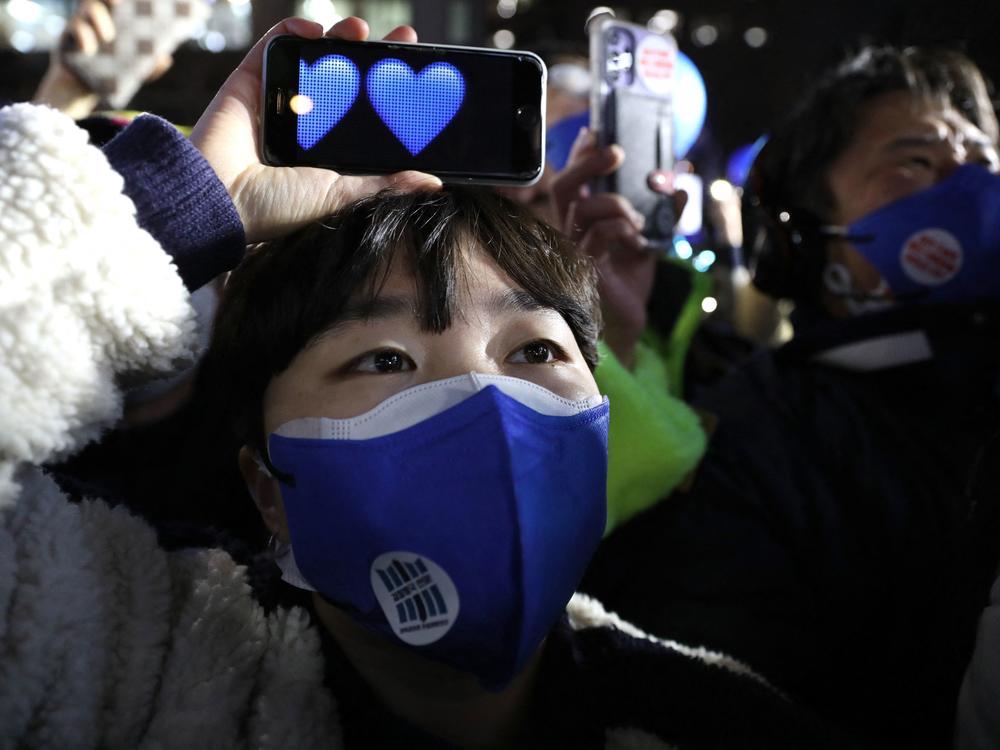Section Branding
Header Content
As South Koreans go to the polls, a backlash against feminism has become political
Primary Content
SEOUL — South Korean voters head to the polls Wednesday in a presidential election that has been characterized as being light on issues, heavy on political scandals and divided along generational and gender lines.
The election that will choose South Korea's next president is noteworthy in that young swing voters in their 20s and 30s, who make up roughly a third of eligible voters, and whom candidates have been aggressively courted, could prove key.
Polls show that, despite its flaws, young women still prefer the ruling liberal Democratic party, while young men prefer the conservative opposition People Power Party. But analysts say that young voters in general are disillusioned with both main parties, which have held alternated in power over the past decade.
Among that demographic in this election, gender equality is a particularly contentious and polarized issue, thanks in part to an anti-feminist backlash, driven by young men who feel resentful and threatened by the changing balance of power between the sexes.
The anti-feminists felt buoyed last year at their apparent victory in opposing an advertising campaign. The ads featured a picture of a thumb and forefinger a fraction of an inch apart, seemingly describing a tiny object. Some men felt that the ad was belittling their manhood, and their outcry forced corporations and public institutions to scrap the ads.
Politicians are seen as exploiting gender divisions
Meanwhile, some observers express concern that the young men's frustration is being exploited by those in power.
"Rather than seeing the 20-something men's perception of reality too negatively, I think we should point out that politicians are using it in this election," says Kwon Soo-hyun, director of the Seoul-based civic group Korea Women's Political Solidarity.
That kind of allegation is frequently aimed at former prosecutor and People Power Party candidate Yoon Suk Yeol.
Last month, Yoon argued that there is no structural gender discrimination in South Korea. His rival, Democratic Party candidate Lee Jae-myung asked him in a TV debate last week if he still meant it. Yoon backpedaled, as he has on several occasions.
"I can't say there is none," he said, "but what's important is that we don't divide men and women into groups and approach this as an issue of gender equality."
Yoon has blamed feminism for South Korea's slumping birth rate, the lowest among developed economies of the Organization for Economic Cooperation and Development.
Conservatives are calling for ministry to be shut down
He has also pledged that, if elected, he will abolish the Ministry of Gender Equality and Family. The promise increased his support in the polls, but enraged feminists.
Activist Park Ji-hyun noted at a rally for Lee in Seoul last week that the ministry doesn't just promote gender equality, it runs programs that help victims of sexual violence, and single mothers with kids. Park warned that Yoon's policies could put those women at risk.
"Our survival depends on who gets elected," she explained. "Misogyny has never come to the fore like it has in this election."
Activist Kwon says Yoon could easily scrap the ministry, and while it might get him some votes, it wouldn't do much to improve young men's social or economic prospects.
She says that politicians such as Yoon, "are actually not interested in the real problems experienced by the 20-something men. The demands the men are making are not that hard to meet."
South Korea has one of the world's widest gender gaps
Despite gradual progress in recent decades, South Korea still lags behind other developed economies in terms of the wage gap between men and women, and women's political participation.
Many young South Korean men, meanwhile, feel they're losing out to women in the grueling competition to get into a limited number of top colleges, land jobs at the country's top corporations, and afford homes in greater Seoul.
Apartment prices in the greater capital region have doubled to an average of around $1 million during the administration of President Moon Jae-in, who will step down in May after serving the legal limit of one five-year term.
The political rise of the disgruntled young men has been personified by the leader of the People Power Party, 36-year-old Harvard graduate Lee Jun-seok.
In a TV debate last year, he argued that he is not against women, but he feels affirmative action is no longer necessary, and calls for meritocracy.
"I have never called for women to be put at a disadvantage," he said in a televised debate last year. "All I said was that these benefits are excessive, they amount to reverse discrimination, and should be amended, now that times have changed."
He has also compared radical feminists to terrorists.
The ruling Democratic Party, though, has also managed to alienate many female voters, candidate Lee Jae-myung admitted in the debate.
"Mayors and governors from our party committed sexual violence," he noted, "and other members of our party committed secondary damage, calling the accuser an 'alleged victim.'"
Lee apologized for the behavior of the officials, including Seoul Mayor Park Won-soon, who committed suicide in 2020 after his secretary accused him of sexual harassment.
With young voters disillusioned by both major parties, Kwon says she'll be looking at the voting behavior of 20-something women, who have shown the strongest support of any demographic for third party candidates, and whose choices could offer a glimpse of the likelihood of a shift away from the current two-party dominated system.
NPR's Se Eun Gong in Seoul contributed to this report.
Copyright 2022 NPR. To see more, visit https://www.npr.org.

